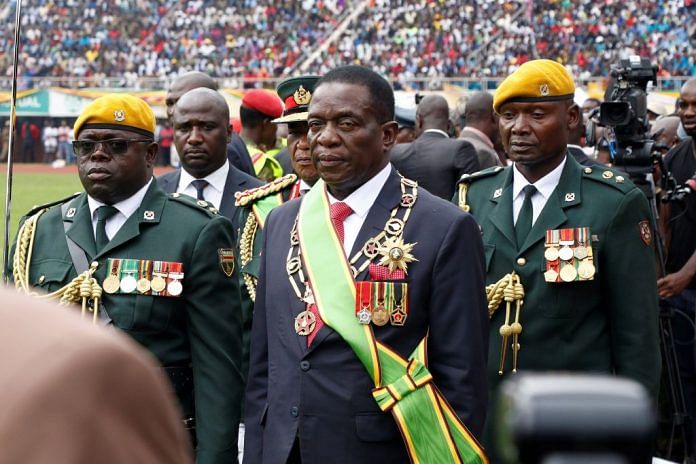Zimbabwe’s new leader has a murky track record, as does Pervez Musharraf, who seems to be eyeing a return to power. A powerful status quo is also being established in the Middle East, with Bashar al-Assad in Syria being backed by Russia- and unreliable American foreign policy.
Enter the Crocodile
Zimbabwe’s new leader, Emmerson Mnangagwa, known as “the Crocodile”, is no improvement on Robert Mugabe, writes Max Bearak in the Washington Post. A veteran politician who has been both in and out of favour with Mugabe, Mnangagwa has held several ministerial positions, as well as the director of the Central Intelligence Organisation.
One of the most serious accusations levelled against Mnangagwa is “orchestrating a vicious cleansing of political opposition in the country’s Matabeleland region,” in which as many as 20,000 people were killed.
Bearak quotes what Wilf Mbanga, the editor of the weekly magazine Zimbabwean had to say about the new head of state: “Over the years, like his master Mugabe, he has been accused of masterminding election violence, kidnappings, extortion, plundering national resources and other crimes.”
“Mnangagwa, like his predecessor, was not elected,” notes Bearak. “Like Mugabe, he, too, is being cheered into power, if only because what came before each of them was so terrible.”
Musharraf not retiring yet
In a recent interview, Pervez Musharraf said that he truly believes that if he came back to power in Pakistan, he would have more legitimacy now than ever before, because people thought of him as a dictator in the past.
“There’s a slight problem, though,” Mohammad Hanif explains in the New York Times. “He wants to rule a country that he has refused to return to since leaving it last year. He is an absconder in multiple court cases, some involving charges of murder and treason. And there is his record as president of Pakistan.”
Many problems Pakistan faces today are not because of Musharraf, but the origin of some of them can be traced to his rule, he says.
“When Musharraf was in power in Islamabad there was a joke going around: What’s the difference between Musharraf and God? God doesn’t think he is Musharraf. And who can blame him,” writes Hanif.
The Bearhug
Last week, Vladimir Putin and Bashar al-Assad hugging each other made headlines and The Washington Post has analysed the significance of this friendship in an editorial.
“The embrace was Mr. Putin’s way of celebrating his success in rescuing the Assad regime from military defeat and propelling it to a string of victories over the Western-backed opposition in the past two years. It also eloquently communicated Mr. Putin’s objectives in the coming diplomacy: sustaining the regime in power indefinitely, providing a new platform for Russia in the Middle East and marginalising the United States,” the editorial says.
This project will further entrench Iran, and support Assad’s dictatorial rule. Turkey and Saudi Arabia too seem to be throwing their weight behind Russia, which creates a very clear power differential in the Middle East, where countries like Yemen continue to suffer in a terrible humanitarian crisis.
“It could be that Mr. Putin will fail as an architect of a Syrian settlement in spite of the opposition’s weakness and U.S. incoherence,” the editorial concedes. But, “for now, however, Russia has supplanted the United States as the convening power of the Middle East’s most important conflict.”
The Unorthodox President Trump
Donald Trump’s unorthodoxy is not as harmful as conventional American foreign policy, writes Uri Friedman in The Atlantic.
“Leaving aside his genuinely unprecedented moves in trade and diplomacy, the wars that Trump is currently commanding were initiated by his predecessors. When it comes to the real use of military force, rather than the tweeted kind, Trump has acted rather like a “normal” U.S. president—only more so, as he’s escalated some conflicts he inherited,” writes Friedman
Still, Trump’s sensationalism and unfiltered opinions are what scares people the most. The threat of what he could do—if he does do anything—is what triggers panic and stress.
“The consequences of what he’s done thus far haven’t yet come into focus,” writes Friedman.
Friedman goes on to evaluate all of Trump’s foreign policy dealings, giving special attention to North Korea.
“While it’s astounding and unsettling to see the president of the United States call North Korea’s leader “short and fat, no one died in the making of that tweet,” he writes.



